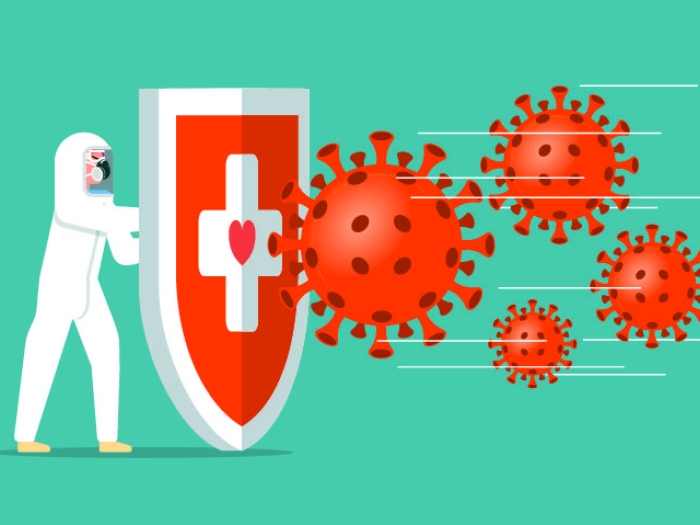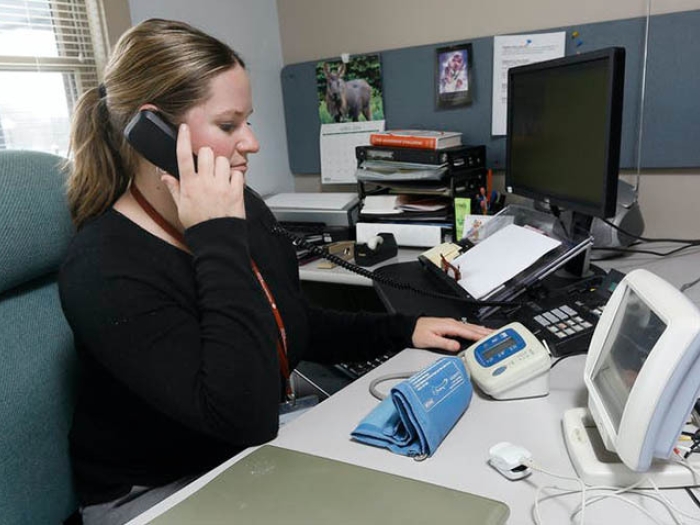Michelle Davis knew the possible complications of the coronavirus, but never imagined she would become a patient herself.
10:30 AM
Author |
Editor's note: Information on the COVID-19 crisis is constantly changing. For the latest numbers and updates, keep checking the CDC's website. For the most up-to-date information from Michigan Medicine, visit the hospital's Coronavirus (COVID-19) webpage.
Interested in a COVID-19 clinical trial? Health research is critical to ending the COVID-19 pandemic. Our researchers are hard at work to find vaccines and other ways to potentially prevent and treat the disease and need your help. Sign up to be considered for a clinical trial at Michigan Medicine.
Michelle Davis was just recovering from influenza A when she realized something was terribly wrong on April 8. "It was terrifying. Unlike anything I'd ever experienced," said Davis, 59, an educational nurse coordinator in the Pediatric Intensive Care Unit at Michigan Medicine. "I could not get a breath in."
She went to the health system where she worked, but this time as a patient.
A test for COVID-19 came back positive. She knew the disease could be devastating. Still, Davis thought she could take care of herself at home. She was a nurse, after all, and one who was experienced with giving herself breathing treatments at home for her asthma and the respiratory condition bronchiectasis. A regular hiker who easily endured 40 hours a week as a nurse, she didn't think the virus would require her to be hospitalized.
MORE FROM MICHIGAN: Sign up for our weekly newsletter
The intense COVID-19 symptoms started on a Wednesday. By Saturday of that week, April 11, her husband said he wasn't comfortable with her staying home any longer. As if contracting a potentially fatal illness weren't enough for one person to handle, Davis's mother also died that day (of non-COVID-related issues).
SEE ALSO: Seeking Medical Care During COVID-19
"It was easily the worst day of my life," recalls Davis, who has been a nurse at the University of Michigan since 1995.At Michigan Medicine, she was admitted to floor 4B. Her hemoglobin levels were frighteningly low—only seven grams per deciliter, when 12-15.5 is the normal range for women. She was given iron to raise those levels. Initially, she was given inhalers to help with her breathing, but she simply couldn't inhale.
Her oxygen levels dipped to 80%—a level so low that it could put vital organs in danger. "After a few days, I ended up decompensating and went to the RICU," Davis said, referring to the Regional Infectious Containment Unit that was set up at Michigan Medicine when the pandemic began. Many of the sickest COVID-19 patients at the hospital were treated in this 32-bed isolation unit. Davis was the sickest she had ever been. She burned with a fever, couldn't get enough air, and was too fatigued to move. Yet she knew she was in good hands. She knew many of the respiratory therapists and nurses who treated her and who stopped by to check on her. "Some of them brought me care packages. They would wave and text," she recalls. All of the attending physicians, nurses, and respiratory therapists "advocated in my best interest," Davis said.

Davis struggled with her knowledge of what all of the codes and alarms on the floor meant—and that some patients around her were dying. But she was lucky. Her numbers began to increase, and, by April 25—two weeks after she was admitted—she was discharged.
Nurses and other providers lined the hallway and greeted her like a celebrity on the red carpet. They posed for selfies with Davis: their peer, and a success story. They applauded. You could see Davis's smile, even through her mask.
SEE ALSO: Keeping Our Patients Safe During COVID-19
She's still recovering at home, still fatigued and winded. She uses a nebulizer every four hours. She knows it will be weeks or months before she can go hiking Up North, or even for short walks around her neighborhood. Her goal is to be well in time for her daughter's October wedding. "I just want to be the healthiest, best version of me," she said. Davis has always defined herself in large part through her role as a nurse, and a nurse educator. "Taking care of critically ill kids has always been a piece of me. I can't imagine my life without that," she said. "I can't wait to be strong enough to return to work."
Davis also doesn't want this story to be about her. "I want it all to be on the people who are doing this amazing work," from nurses to physicians to respiratory therapists.

Since it's National Nurses Week, Davis wants the spotlight to shine particularly brightly on her peers. "Yes, we're in a pandemic, and they have been extraordinary during this time. But nurses are the ones that are there at the bedside, no matter what. I think the heart of a nurse is an amazing thing. You can't do this job for just a paycheck."
While other providers play specialized roles that are equally vital, she said, nurses have the special burden—and privilege—of caring and advocating for patients throughout their stay.
"The nurse at the bedside doesn't take a snapshot," Davis said. "They take the whole, full-length motion picture."
Like Podcasts? Add the Michigan Medicine News Break to your Alexa-enabled device or subscribe for daily updates on iTunes, Google Play and Stitcher.

Explore a variety of healthcare news & stories by visiting the Health Lab home page for more articles.

Department of Communication at Michigan Medicine
Want top health & research news weekly? Sign up for Health Lab’s newsletters today!





